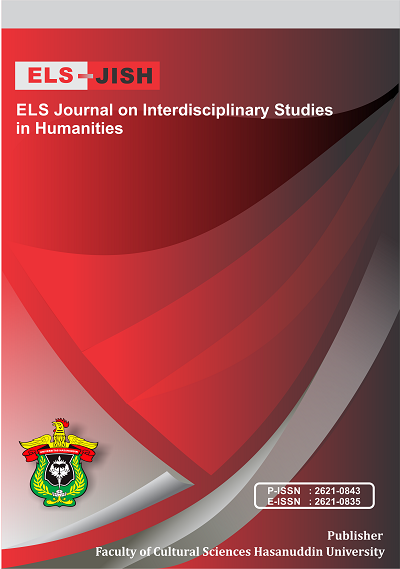Undergraduate EFL Students’ Perspective on Critical Reading
DOI:
https://doi.org/10.34050/elsjish.v7i2.36589Keywords:
Critical Reading, EFL Students, Students' perspectiveAbstract
This study explores students' perspectives on critical reading, a crucial skill for academic success and intellectual development, focusing on fourth-semester undergraduates at STKIP YPUP Makassar. By analyzing their responses, the research identifies key factors influencing their engagement with critical reading practices. Although students reported a degree of confidence in their critical reading skills, they encountered significant challenges, including limited vocabulary, difficulty understanding complex texts, and inadequate resources. These findings highlight a disconnect between students' perceived abilities and their actual performance, suggesting that their confidence may not fully reflect their competencies in critical reading. The study underscores the need for improved teaching methods to address these challenges effectively. It suggests that educators should develop more targeted instructional strategies and provide additional resources to support students in overcoming their difficulties with critical reading. Given the students' reliance on teacher guidance, enhancing instructional practices is essential for helping them build stronger critical reading skills. The implications of these findings are significant for curriculum development and instructional practices in higher education, offering valuable insights for creating more effective approaches to foster critical reading skills and support students' academic success.Downloads
References
A. Al Roomy, M. (2022). Investigating the Effects of Critical Reading Skills on Students’ Reading Comprehension. Arab World English Journal, 13(1), 366–381. https://doi.org/10.24093/awej/vol13no1.24
Clark, C., & Douglas, J. (2011). Young People’s Reading and Writing An in-depth study focusing on enjoyment, behaviour, attitudes and attainment.
Dorji, R. (2020). A Survey study on the Reading habits among English Major Students of Sherubtse College: Issues and Perspectives. In International Journal of Information Technology and Language Studies (IJITLS) (Vol. 4, Issue 3). http://journals.sfu.ca/ijitls
Hamuddin, B., Rahman, F., Pammu, A., Sanusi Baso, Y., & Derin, T. (2020). Cyberbullying Among EFL Students’Blogging Activities: Motives and Proposed Solutions. Teaching English with Technology, 20(2), 3-20.
Hasnia, H., Andini, C., Tahir, M. D., Hunaeni, H., Zulfikariandi, Z., & Muslimin, M. T. (2022). The Ability of 1st Class Students of SMAN 11 Enrekang to Arrange Verbal and Nominal Sentences. ELS Journal on Interdisciplinary Studies in Humanities, 5(3), 539-550.
Lodico, M. G., Spaulding, D. T., & Voegtle, K. H. (2006). Methods In Educational Research From Theory to Practice.
Niculescu, B.-O., & Dragomir, I.-A. (2023). Critical Reading - A Fundamental Skill for Building 21 st Century Literacy . International Conference Knowledge-Based Organization, 29(2), 215–220. https://doi.org/10.2478/kbo-2023-0060
Ozensoy, A. U. (2021). The Effect of Critical Reading Skill on Academic Success in Social Studies. Eurasian Journal of Educational Research, 21(93). https://doi.org/10.14689/ejer.2021.93.15
Suzanne,N. (2011). Being Active Readers By Applying Critical Reading Technique. https://dx.doi.org/10.31958/jt.v14i1.197
Rahman, F. (2018). The constraints of foreign learners in reading English literary works: A case study at Hasanuddin University. Journal of Arts and Humanities, 7(2), 01-12.
Rahman, F., & Amir, P. (2019). Trends in Reading Literary Fiction in Print and Cyber Media by Undergraduate Students of Hasanuddin University. International Journal of Education and Practice, 7(2), 66-77.
Rasyid, M. N. A., Rauf, M., Junaid, S., Nur, S., & Syukur, H. (2023). Assessing Listening Comprehension Skills in Indonesian Islamic Higher Education EFL Classrooms: Current Practices, Challenges and Solutions. Indonesian TESOL Journal, 5(2), 321-338.
Ridzuan, A., Soffiq Saripin, M., & Zaidi Mat Saat, M. (2023). Higher-order Thinking Skills and Employability Skills among Students at Pahang’s Higher Education Institutions. https://doi.org/10.6007/IJARBSS/v13-i5/16849
Shamida, A., Sidhu, G. K., Kamil, S., & Du, R. (2023). EFL Students’ Perspectives and Challenges in Critical Reading Skills for Postgraduate Study. Environment-Behaviour Proceedings Journal, 8(25), 21–26. https://doi.org/10.21834/e-bpj.v8i25.4867
Wilson, K. (2016). Critical reading, critical thinking: Delicate scaffolding in English for Academic Purposes (EAP). Thinking Skills and Creativity, 22, 256–265. https://doi.org/10.1016/j.tsc.2016.10.002
Younis, S., Naeem, S., Ali, Z., Yaqoob, N., & Ullah, N. (2023). A Study Of The Relationship Between Critical Reading And Critical Thinking Abilities Of Undergraduate Learners. In Journal of Positive School Psychology (Vol. 2023, Issue 4). http://journalppw.com
Yulian, R. (2021). The flipped classroom: Improving critical thinking for critical reading of efl learners in higher education. Studies in English Language and Education, 8(2), 508–522. https://doi.org/10.24815/siele.v8i2.18366
Yunus, M., & Ubaidillah, M. F. (2021). EFL teacher educators’ experiences in teaching critical reading: evidence from Indonesia. Journal on English as a Foreign Language, 11(2), 422–441. https://doi.org/10.23971/jefl.v11i2.3133
Downloads
Published
How to Cite
Issue
Section
License
Copyright (c) 2024 Rahmah Julianti, Shinta Dewi Anggung, Nur ima

This work is licensed under a Creative Commons Attribution-ShareAlike 4.0 International License.

















